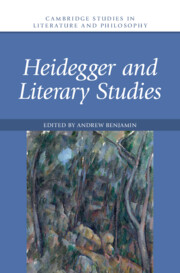Book contents
- Heidegger and Literary Studies
- Cambridge Studies in Literature and Philosophy
- Heidegger and Literary Studies
- Copyright page
- Contents
- Contributors
- Heidegger and Literature: An Introduction to the Question
- I Literature and Poetry
- II Heidegger and Greek Literature
- III Heidegger and Literary Works
- Heidegger, Index of Works
- General Index
- References
II - Heidegger and Greek Literature
Published online by Cambridge University Press: 09 November 2023
- Heidegger and Literary Studies
- Cambridge Studies in Literature and Philosophy
- Heidegger and Literary Studies
- Copyright page
- Contents
- Contributors
- Heidegger and Literature: An Introduction to the Question
- I Literature and Poetry
- II Heidegger and Greek Literature
- III Heidegger and Literary Works
- Heidegger, Index of Works
- General Index
- References
Summary

- Type
- Chapter
- Information
- Heidegger and Literary Studies , pp. 119 - 182Publisher: Cambridge University PressPrint publication year: 2023



